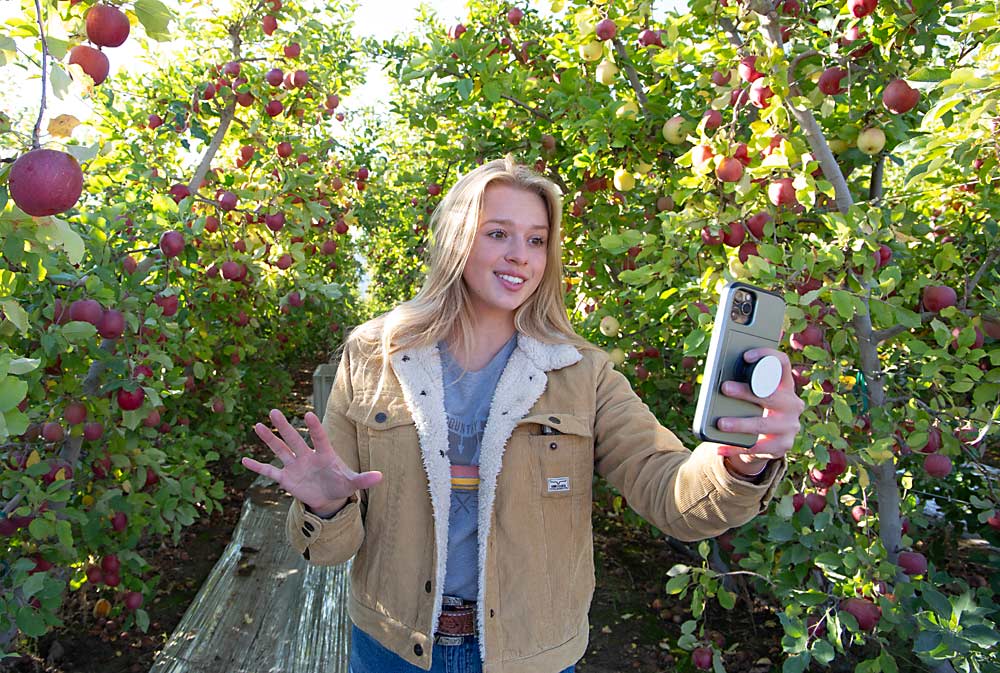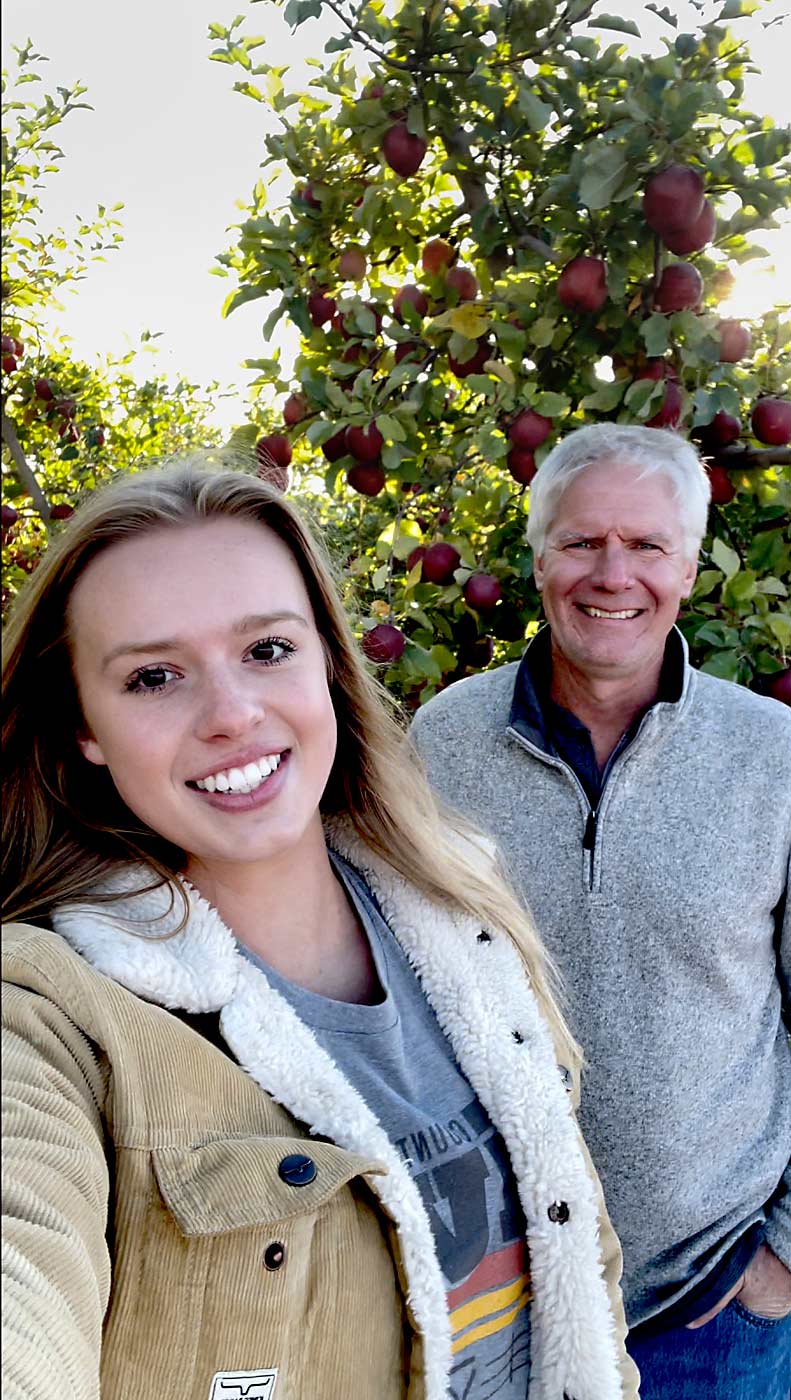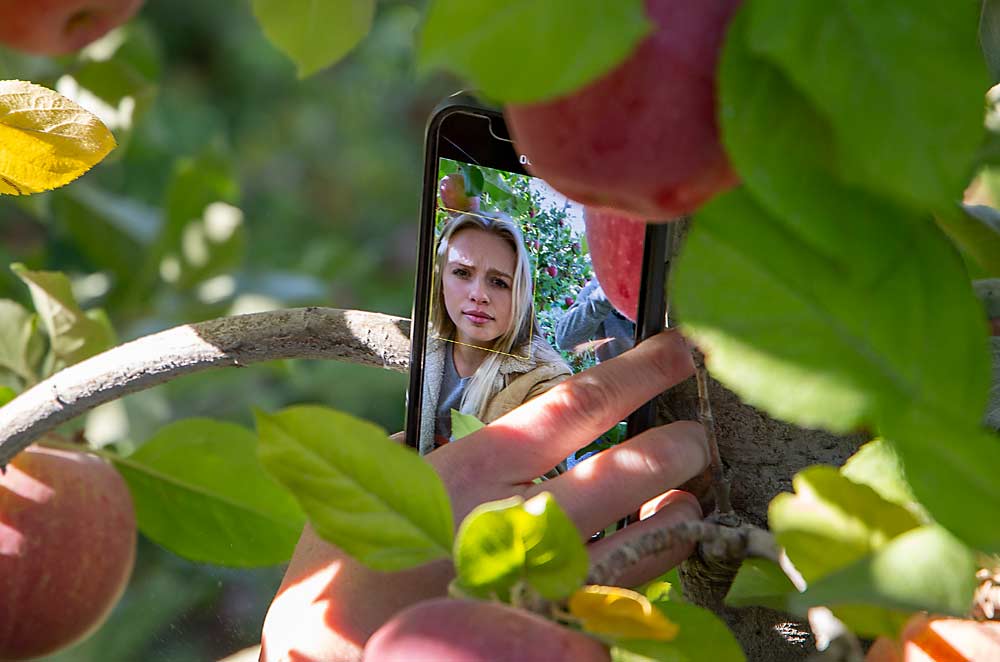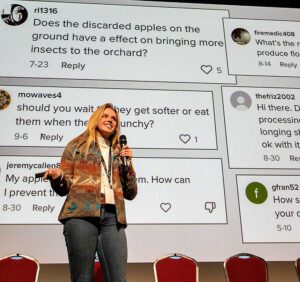
Tree fruit industry organizations implore growers to “tell their own stories” for marketing, government authorities or media.
To help, Good Fruit Grower asked for a few pointers from an outgoing, self-taught semi-celebrity and expert in modern ag storytelling: Kaitlyn Thornton. A 21-year-old farmfluencer who grew up on a Tonasket, Washington, apple and pear orchard, Thornton is about to wrap up a bachelor’s degree in marketing at Washington State University.
Her primary lesson: Don’t overthink it. Customers crave authenticity, so just turn your smartphone camera on yourself and start sharing memories good, bad and ugly.
“It doesn’t have to be complicated, OK,” she said. “If you lived it, you might as well talk about it.”
Pear Bureau Northwest, the Oregon-based nonprofit that collectively markets Northwest pears under a federal marketing order, has the same message of simplicity.

“The fact that it’s not professional actually makes it better,” said Jim Morris, marketing communications manager.
He and his team are trying to launch a series of homemade “Meet the Grower” videos that deliver a few simple messages straight from growers to consumers via the social media platform TikTok. The first and only installment so far features Erica Bland-McConnell, a fourth-generation Wenatchee Valley pear grower. She stands in a row of pear trees and discusses how long she has been farming, what varieties she grows and some of the farming challenges.
Bland-McConnell filmed the raw video. The pear bureau edited it with some music, a graphic image and some simple text — a format Morris hopes will make it easier for others to do.
“Honestly, it was really easy,” said Bland-McConnell, who also films short, unedited video clips for her sales desk, Rainier Fruit.
Thornton, Bland-McConnell and other growers on social media are meeting a need. Shoppers want to know where their food comes from, according to most customer surveys, and they put farmers high on the list of trusted food information sources.
Pear Bureau Northwest has discussed collaborating with Thornton, Morris said.
Growers’ personal stories also sway public policy. Washington State Tree Fruit Association officials meet understandable reluctance when they seek personal stories to accompany their policy advocacy in Olympia, but they want growers to know sharing them makes an impact.
“Broad principles backed up by statistical evidence makes for sound public policy, but an individual relating his or her experience creates the understanding and sympathy that leads to political and consumer action,” said Jon DeVaney, president of the association.
Thornton said there’s nothing to be afraid of.
She suggests starting with memories and farm stories. Remember the year the leaves didn’t fall from the trees? How about that time you harvested apples in the snow? And what about that hailstorm that nearly wiped you out?
She has discussed all those topics and more, sometimes with a smile, sometimes with a voice shaky from sadness.
“There are different, just funny things that happen on the farm, or exciting or even heartbreaking things that happen on the farm, and people genuinely care about those,” she said.
Today, Thornton has a robust following on social media and owns a social marketing company named Agnovo that counts Bose audio, Envy apples and Dickies workwear among her clients. She also runs her own direct fruit sales business called Kait’s Crates, while a Walmart produce buyer recently visited her family’s Tonasket farm for a profile on the retailer’s website.

However, she started — at age 15 — simply by posting apricots for sale on Facebook, said her father, Geoff Thornton. It was during a string of bad years, and the fruit was going to fall to the ground anyway, so he challenged her to sell 20 boxes. She doubled that amount, and he had to hire one of his employees to drive her around and make deliveries. Kait’s Crates was born.
Only a year or so later, he asked his daughter to make some videos about their farm, and he used those when courting some emergency lenders after his traditional bank decided to foreclose on him. He secured the emergency loan and has since transitioned back to traditional banking.
“We’ve been through all these hard times, but I’ve incorporated Kaitlyn the whole way,” he said.
He takes her authenticity advice to heart. Other friends in the industry also have told him that lenders appreciate it, even when it’s bad news. In fact, he even publicly discusses painful topics such as divorce and his struggles with alcoholism. He celebrated six years of sobriety in late October.
After graduation, Thornton plans to return to Tonasket and become the fourth-generation farm CEO. Her siblings either work in other industries or are just starting their college careers. She may venture into a farm stand too, she said.
Until then, she encourages her fellow growers to just tell the truth on camera and to shake off impostor syndrome. Customers do not expect perfection.
“Remember that you are the real deal,” she said. “You are a farmer, and people just love that fact. Talk about what you do every day, and I promise people will care.”
A few tips
Fourth-generation fruit grower Kaitlyn Thornton, known for her social media orchard videos, encourages growers to get started with their own clips by just turning on the camera and telling stories. For growers who want a little more advice, she offered the following tips:
—Pick topics you understand and answer consumer questions. Why are rows shaped like V’s? What’s with the tinfoil on the ground? How can a heavy crop be both good and bad news for a grower?
—Stand where lighting is relatively even, to avoid harsh shadows and glares. Tap around the screen and the phone will adjust the exposure for you.
—Don’t cuss.
—Recruit a tech-savvy daughter, son, niece, nephew or younger worker to help. It will expose them to an opportunity and give you a chance to bond with a younger generation.
—She uses a button handle, such as a PopSocket grip, on the back of her phone case to help hold her camera and sometimes mounts it on a trellis wire for different angles.
—She avoids tripods and extra lights.
—Editing is not mandatory. However, she uses an app called CapCut, which she says is intuitive and simple.
—She films only once, but sometimes she edits differently for different platforms. For example, TikTok videos are intentionally jumpy, while she keeps things smoother for Instagram.
—Her social media platforms of choice are Instagram, TikTok, LinkedIn, Snapchat and a little bit of YouTube. For growers just starting, she recommends Instagram for its intuitive design, internal editing options and consumer reach. To get a message to retailers and buyers, she suggests LinkedIn.
—Don’t be afraid to start over. The videos aren’t live. She keeps an inventory of her own bloopers, usually from when her brain just freezes midsentence. “I also have the problem where I stumble over my words so much because I sometimes think faster than I talk,” she said.
—by Ross Courtney







Leave A Comment